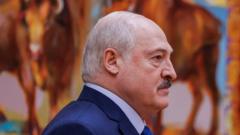For many citizens, the specter of civil unrest and instability looms large. Following the nearly universal disapproval of the results in the 2020 election, where Lukashenko was met with accusations of vote-rigging and subsequent mass protests, the current atmosphere is rife with fear of governmental repercussions. Observers note that any semblance of genuine opposition has been effectively eradicated, with key figures imprisoned or in exile. The European Union has labeled the upcoming election as a “sham,” underscoring the lack of a fair political environment.
The few candidates on the ballot are seen more as political placeholders rather than genuine alternatives, with some, like Communist leader Sergei Syrankov and right-wing politician Oleg Gaidukevich, expressing support for Lukashenko while running against him. Conversations with ordinary Belarusians indicate that many prioritize stability over democratic ideals, fearing that change could evoke turmoil similar to that experienced in neighboring Ukraine. This fear plays into Lukashenko's favor as he continues to assert dominance over the political landscape, reinforcing a narrative of stability amidst uncertainty.
Ultimately, the 2025 presidential election in Belarus is set to unfold within a context of oppression and resignation, highlighting the troubling state of democracy and civil liberties in a nation under authoritarian rule.
The few candidates on the ballot are seen more as political placeholders rather than genuine alternatives, with some, like Communist leader Sergei Syrankov and right-wing politician Oleg Gaidukevich, expressing support for Lukashenko while running against him. Conversations with ordinary Belarusians indicate that many prioritize stability over democratic ideals, fearing that change could evoke turmoil similar to that experienced in neighboring Ukraine. This fear plays into Lukashenko's favor as he continues to assert dominance over the political landscape, reinforcing a narrative of stability amidst uncertainty.
Ultimately, the 2025 presidential election in Belarus is set to unfold within a context of oppression and resignation, highlighting the troubling state of democracy and civil liberties in a nation under authoritarian rule.




















